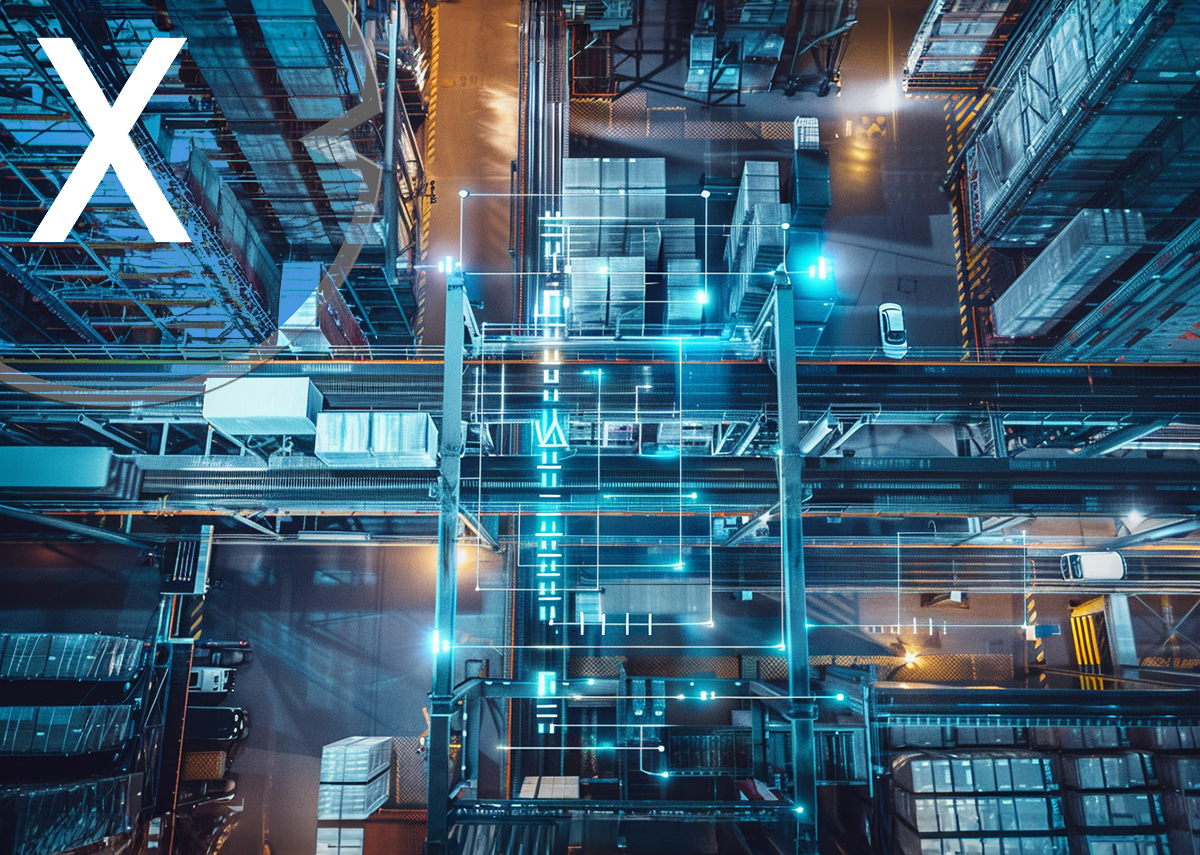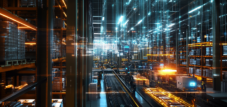
Competitive advantage through intelligent automation systems: The future of warehouse automation and networked warehouse processes – Image: Xpert.Digital
🏭🔍 From warehouse to high-tech center: The rise of automation systems
⚙️📊 Optimization on the rise: How automation keeps companies competitive
In an increasingly digital world and ever-intensifying global competition, companies are forced to optimize their processes to remain competitive. One area where this is particularly evident is warehousing. Modern warehouse automation systems and networked processes offer companies enormous potential to increase their efficiency and secure their competitiveness. This article explores how intelligent automation systems are revolutionizing the future of warehousing and what benefits companies can gain as a result.
🚀 The growing importance of warehouse automation
Historically, warehousing was a labor-intensive area reliant on manual processes. This often led to errors, inefficiencies, and supply chain delays. However, with the advent of new technologies, particularly automation, this picture has fundamentally changed. Companies are increasingly recognizing the need to automate their warehousing processes to meet the rising demands of globalized markets.
"Automation in warehouses is no longer just an option, but a necessity." This statement sums up the fact that manual processes can no longer meet modern requirements. The use of intelligent automation systems that integrate robots, artificial intelligence (AI), and the Internet of Things (IoT) enables companies to make their warehouse processes faster, more efficient, and more error-free.
🧠 Intelligent automation systems: What makes them special
Intelligent automation systems go far beyond simple mechanization. They are based on the use of data and the implementation of advanced technologies to make decisions in real time. These systems include, among other things:
Robotics technology
Robots take over numerous tasks in modern warehouses, from order picking and packing to transporting goods. These robots work quickly, precisely, and around the clock, which significantly increases productivity.
Artificial intelligence and machine learning
AI-driven systems analyze large amounts of data and can make predictions that optimize warehouse operations. For example, algorithms can identify the ideal storage location for specific products or predict when certain items need to be reordered.
Networked Systems (IoT)
The Internet of Things makes it possible to network machines and systems and exchange information in real time. For example, sensors in shelves can monitor the fill level of stock and automatically request replenishment when certain thresholds are reached.
These technologies optimize the entire warehousing process, from delivery and storage to shipping. Automation eliminates many potential errors and reduces costs, as less manual intervention is required and productivity is significantly increased.
💡 Advantages of intelligent warehouse automation
Implementing intelligent automation systems offers companies a multitude of advantages that directly impact their competitiveness. Some of these advantages include:
Higher efficiency and speed
The use of robots and networked systems allows warehouse processes to be carried out significantly faster. For example, orders can be picked and shipped in a very short time. This leads to improved customer satisfaction, as delivery times are reduced and errors are minimized.
Cost reduction
Automation reduces the need for manual labor, which is a significant advantage, especially in times of rising labor costs. Furthermore, more precise processes reduce errors, which in turn lowers the costs of returns and rework.
Improved inventory management
Thanks to networked systems and IoT technology, inventory levels can be monitored in real time. This enables more accurate planning and reduces the risk of overstocking or shortages. Companies can thus react more efficiently to fluctuations in demand and optimize their inventory levels.
Flexibility and scalability
Automation systems can be flexibly adapted to changing requirements. This is particularly advantageous during periods of growth or seasonal peaks. An automated warehouse can quickly respond to higher order volumes without requiring additional resources.
Increased security
Many warehouses pose a significant risk of accidents, particularly in manual processes. The use of robots and automation systems considerably reduces this risk, as many dangerous tasks are taken over by machines.
🔮 Networked warehouse processes: The warehouse of the future
Besides automation, the networking of warehouse processes plays a central role in the future of warehousing. A networked warehouse is based on the integration of IoT, AI, and data analytics to ensure seamless communication between all warehouse components. This enables not only greater efficiency but also better control and monitoring of the entire warehouse operation.
In a networked warehouse, machines, sensors, and systems continuously exchange data. For example, autonomous vehicles can automatically transport goods from one area of the warehouse to another, while AI algorithms calculate the optimal route to save time and energy. At the same time, sensors monitor the condition of the machines to schedule maintenance in a timely manner and minimize downtime.
This networking extends not only to the warehouse itself, but also to other areas of the supply chain. For example, real-time inventory information can be shared with suppliers to plan replenishment more efficiently. Similarly, customers can be directly involved in the process by being informed about the status of their orders.
⚠️ Challenges of warehouse automation
Despite the numerous advantages, companies also face challenges when implementing intelligent automation systems. One of the biggest hurdles is the high investment costs associated with introducing such systems. Not every company has the financial resources to implement comprehensive automation projects. However, it must be considered that the long-term cost savings and efficiency gains often justify the initial investment.
Another obstacle is integrating existing systems into the new automation environment. Many companies have outdated IT infrastructures that are not readily compatible with modern automation systems. Careful planning and collaboration with experienced technology partners are therefore crucial to ensuring seamless integration.
Finally, automation also requires new skills and knowledge from employees. Companies must ensure that their workforce is trained in the use of the new technologies and develops the necessary competencies to fully exploit the potential of automation.
🌐 The future of warehouse automation
The future of warehousing undoubtedly lies in the automation and networking of processes. Intelligent automation systems offer companies the opportunity to increase their efficiency, reduce costs, and secure their competitiveness. Particularly in a globalized world where speed and precision are crucial success factors, automation can provide a significant competitive advantage.
Companies that adopt these technologies early on will be able to adapt to changing market demands and strengthen their position in the long term. The integration of robots, AI, and networked systems will not only increase efficiency but also improve flexibility and scalability – essential factors for future success.
Automation is not just a trend, but the future of warehousing. Companies that recognize this and invest in intelligent automation systems will be the winners of tomorrow.
📣 Similar topics
- 🤖 Intelligent automation: The future of warehousing
- 🏭 Efficiency through robot technology in warehouses
- 📈 AI and machine learning for optimized warehouse processes
- 🌐 Networked systems and IoT in the modern warehouse
- 🚀 Faster and error-free: Advantages of automation
- 🔍 Real-time data analysis for inventory management
- ⚙️ Scalability and flexibility through automation
- 💼 Cost reduction in warehousing through automation
- 🛡️ Warehouse security: Robots instead of people
- 🔧 Challenges and solutions of warehouse automation
#️⃣ Hashtags: #WarehouseAutomation #EfficiencyIncrease #ArtificialIntelligence #NetworkedProcesses #CostReduction
LTW Solutions
LTW offers its customers not individual components, but integrated complete solutions. Consulting, planning, mechanical and electrotechnical components, control and automation technology, as well as software and service – everything is networked and precisely coordinated.
In-house production of key components is particularly advantageous. This allows for optimal control of quality, supply chains, and interfaces.
LTW stands for reliability, transparency, and collaborative partnership. Loyalty and honesty are firmly anchored in the company's philosophy – a handshake still means something here.
Suitable for:
We are there for you - advice - planning - implementation - project management
☑️ Smart City & Factory: Industry expert for energetic 5G buildings and halls as well as advice and installation of solar systems
☑️ Xpert.Plus - logistics consulting and logistics optimization
☑️ Industry expert, here with his own Xpert.Digital Industry Hub with over 2,500 specialist articles
I would be happy to serve as your personal advisor.
You can contact me by filling out the contact form below or simply call me on +49 89 89 674 804 (Munich) .
I'm looking forward to our joint project.
Xpert.Digital - Konrad Wolfenstein
Xpert.Digital is a hub for industry with a focus on digitalization, mechanical engineering, logistics/intralogistics and photovoltaics.
With our 360° business development solution, we support well-known companies from new business to after sales.
Market intelligence, smarketing, marketing automation, content development, PR, mail campaigns, personalized social media and lead nurturing are part of our digital tools.
You can find out more at: www.xpert.digital - www.xpert.solar - www.xpert.plus

